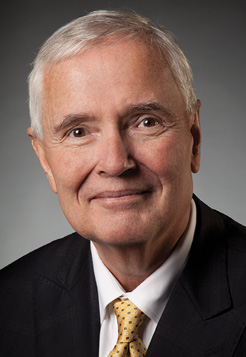
WE RECENTLY BID FAREWELL to professor Dharma deSilva, who died in April at age 83, still tremendously active in his 42nd year as a Wichita State University faculty member.
Long before 2013, when the university adopted the Strategic Plan Vision of being “internationally recognized as the model for applied learning and research,” Dharma had that vision and was making it real. From 1976, when he co-founded the World Trade Council of Wichita until his death, Dharma worked tirelessly on campus, in the local business community, and internationally, to make applied learning part of the business education curriculum.
His colleagues and his former students around the world speak with great affection and respect about his vigor and single-mindedness in creating opportunities for students to interact with professionals in ways that often led to job offers and thriving careers.
Connie Dietz is another Wichita State leader long devoted to the professional success of our students. During Connie’s 22 years at WSU, most recently as executive director of the Career Development Center, she and her staff have built a strong ecosystem benefitting students and employers.
As we prepare for Connie’s retirement this summer, members of president’s executive team have discussed work-based learning and the university’s role in career development. Part of the issue is developing shared vocabulary that reflects the realities of modern applied learning. Historically, we’ve used terms including internship, co-op and part-time job.
All those terms are inadequate for describing the best system that has actually evolved, giving students meaningful professional work experiences that relate to their career aspirations. At the same time, companies, nonprofits or government agencies benefit from the opportunity to form lasting relationships with students beginning as early as the freshman year.
Applied learning is the differentiator in the best experiences we can offer our students. If we can forge clear connections between classroom learning and workplace learning, we will equip our students with important tools for success.
Here’s the definition of applied learning used in our 2016 accreditation documents: Applied learning occurs when students develop knowledge, skills and values from personal direct experiences that go beyond the traditional lecture or lab.
Applied learning encompasses a variety of activities including service learning, undergraduate research, theses, dissertations and other creative (e.g., live performances) and professional services (e.g., practicums, internships, clinical rotations and cooperative education).
To help our students build successful careers and lives, we strive to maximize the quality of classroom, laboratory and online instruction. This means hiring and retaining excellent faculty and providing state-of-the art facilities and technology.
We offer applied research experiences, in which students develop solutions to real-world problems. That is mission-
critical for the entrepreneurship and innovation ecosystem we are building, including the Center for Entrepreneurship, WSU Ventures, Shocker New Venture Competition, the Koch Innovation Challenge, Shocker Innovation Fellows and other offices, competitions and organizations that expand creativity and capability.
Our professors, deans, staff and the WSU Foundation are working constantly to broaden and deepen our relationships with high quality employers. This includes not just for-profit companies like Airbus or Spirit, but also school systems, healthcare providers, government agencies, nonprofits and others who hire our students and graduates.
One of the worst phrases in the English language is “soft skills,” commonly used to describe the ability of employees to adapt to workplace needs, such as listening for meaning, analyzing, collaborating, taking responsibility, displaying a work ethic, dressing and communicating appropriately and in many other ways making themselves useful and welcome.
Helping our students develop these skills is essential, too. There’s nothing “soft” about them.
If you have examples to share of where work-based learning is working well, or have the ability to help our students grow in these ways, please drop me a line, president@wichita.edu.
And thank you for all you do as loyal Shockers.





